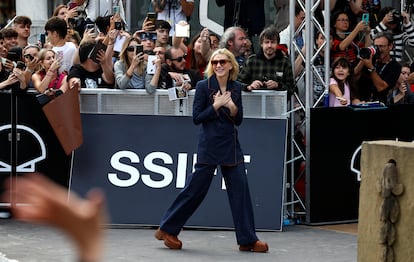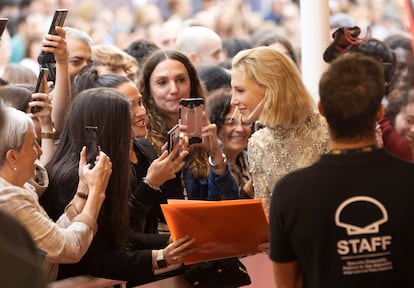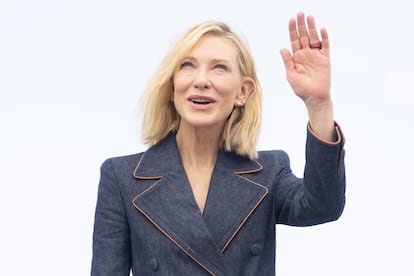Cate Blanchett (Melbourne, Australia, 55 years old) has arrived in San Sebastian in an apparent state of high. She has just repeated with Jim Jarmusch, and her latest releases, Rumours and the series Observed, have allowed her to collaborate with creators she had been pursuing for some time, Guy Maddin and Alfonso Cuarón, respectively. The Donostia Award was presented to her tonight by the Mexican, at the express request of the actress, who told the press, a classic of the stars, to swim and keep her clothes on.
The Donostia award ceremony was presented by actress Marta Etura. After Cuarón’s words, a video was shown with George Clooney admiring “how Blanchett’s art enhances the legacy of acting,” words that brought tears to the actress’s eyes (Clooney, with humour, justified his absence because he was in Venice “drinking and without trousers”). With the award in her hand, the Australian spoke about her “desire to know, about what it is to be human.” “And with so many certainties around us, I am betting on uncertainty, on the search that is born from acting. Yes, it is uncomfortable, we live in complex, uncertain times. But that is where the mind is free. My journey continues, although from time to time it stops on islands of certainty… like this Donostia award,” she said.
Hours earlier, in front of the press, it was made clear that as much as Blanchett enjoys being with filmmakers indiesBlanchett also knows that she has a specific weight in the world audiovisual world. And that leads her to certain twists, such as when she was asked about Israel’s invasion of the Gaza Strip. During the last Cannes festival, Blanchett paraded down the red carpet in a skirt that, depending on how the light hit a fold of fabric, could look like the Palestinian flag. And for weeks, she neither confirmed nor denied that it was. At the Zinemaldia, her answer included a probable tacit acceptance that yes, that haute couture creation by Haider Ackerman for Jean-Paul Gaultier, a tight black dress with a green train and a pale pink, almost white back, had political significance. But she has never confirmed it. What’s more, she has clouded her opinions. “There are many conflicts and human rights abuses. We know about some of them and we cannot provide solutions, although expressing and listening to all points of view is part of democracy. And these are conflicts that are too complex to be resolved either on the red carpet or here, at a press conference.”
I still talk to Pedro and I was delighted that he won in Venice. We have been talking for 25 years about how to collaborate, but an artist knows where he has to go and where not to go in his creative process.”
Second question: at what point is the adaptation of Manual for cleaning women, by American writer Lucia Berlin, whose adaptation rights the actress still owns through her production company, a project that Pedro Almodóvar, its then screenwriter and director, abandoned in September 2022? “I still talk to Pedro and I was delighted that he won at Venice. I was thrilled with his presence and that of Penélope Cruz when I collected the international Goya in 2022. We have been talking for 25 years about how to collaborate, but an artist knows where he has to go and where not to go in his creative process, and Pedro does what he wants and what he must do,” she commented before stressing that these decisions result in masterpieces.
Blanchett has been more incisive about climate change and her desire to leave a smaller carbon footprint, or at least offset it, in her work. “If there are Covid managers on set, why don’t we see equivalents? In our theatre company we have already invested in it, it cost us almost nothing and yet many audiences come to our performances because they want to see a play with almost no carbon footprint,” she said after explaining that she does the same with her documentary production. “We have to naturalise the process. The same goes for inclusivity, let’s bet on it. And by the way, inclusivity entails diversity. On the other hand, the more homogeneous a film or its creative team or even the board of directors of any company is, the more banal the result will be.”

Her path to acting began in a truly strange way. After studying drama, she was called by a production company to answer questions for actors or actresses in casting tests: “I ended up there because they didn’t know what to do with me. I didn’t know myself, and I looked strange. Through that experience I discovered that many casting decisions had already been made before the audition. The great lesson is that rejection is not personal. And I also learned that you have to fight for the roles you are interested in and that you don’t have to do every job.”
Little by little she gained confidence, thanks above all to the theatre, and jumped into cinema. “I became an actress, I entered this strange and mysterious world with ambitions very different from those of most of my colleagues. Ambition has tentacles, it wants to capture many things. I seek out other cultures, and receiving a Donostia at a festival between Javier Bardem and Pedro Almodóvar is incredible. I started in theatre, which remains my great love, because it brings you closer to the public. Cinema takes you away from it, but at least you feel a certain emotional return. It is worse, of course, with the platforms of streaming: They don’t tell you how many people see you, and I’m not interested in it for financial reasons, but rather in knowing who sees us.” This Saturday, in San Sebastian, he also defended having good luck: “Many times it only has to do with it. Now I’ve worked on Alfonso’s (Cuarón) series with Kevin Kline, who was semi-retired, and people are going to be surprised that I’ve been out of work for so long.”
I became an actress, I entered this strange and mysterious world with ambitions very different from those of most of my peers.”
The actress has delved into another question about her search for different things, such as her work in Rumoursin which she plays the German prime minister at a G-7 summit. “When I started, well, not even now, nobody looked for Australian accents in international co-productions. Today, in TV shows and series, you hear the same neutral accent. On the other hand, I think that the more specific the cultural fact is, the more successful it will be globally. We run the risk of wanting to make films to please everyone, films that don’t amount to anything. As an Australian, I invest in my country’s film industry, which is much more powerful than it seems.” And so she went on to discuss how she chooses her projects: “The role that one usually accepts is often the antidote to the precedent. And then I think of Terrence Malick… With him, your performance can end up on the cutting room floor, and that doesn’t mean that the experience hasn’t been important. Sometimes they also offer you something that surprises you, like for example store, “with Todd Field, which at first seemed like a mountain I didn’t know how to climb. In theater, I’ve always turned fear into excitement. So in film, I did the same.”

Before finishing, she reviewed some of her characters, such as the orchestra conductor that Field suggested to her: “With him I realized that some of us are disposable, that the structures support more despicable people. We were lucky that, at its premiere, Warehouse He spoke about the hot topic of the moment: what brutality was like within the creative process and systemic abuses within power.” That same emotional coincidence occurred with Carol. “Todd Haynes took ten years to make it after he proposed it to me. Meanwhile, I continued with other films and my theatre. He had a hard time raising the financing, nobody wanted to distribute it. Today, however, Carol It is very significant. It was released at a time of void in the narrative of LGBT relationships and it still maintains its importance.”
Blanchett has just repeated with Jim Jarmusch, with whom she has filmed Father, Mather, Sister, Brother, 20 years after Coffee and Cigarettes. “Because of raising my children, I couldn’t accept some of his proposals and we lost contact. This shoot has been great. But it has also confirmed to me that things have changed in independent cinema, and it is much more difficult to finance films these days.” indies, and even more guarantee that you will find an audience.”

